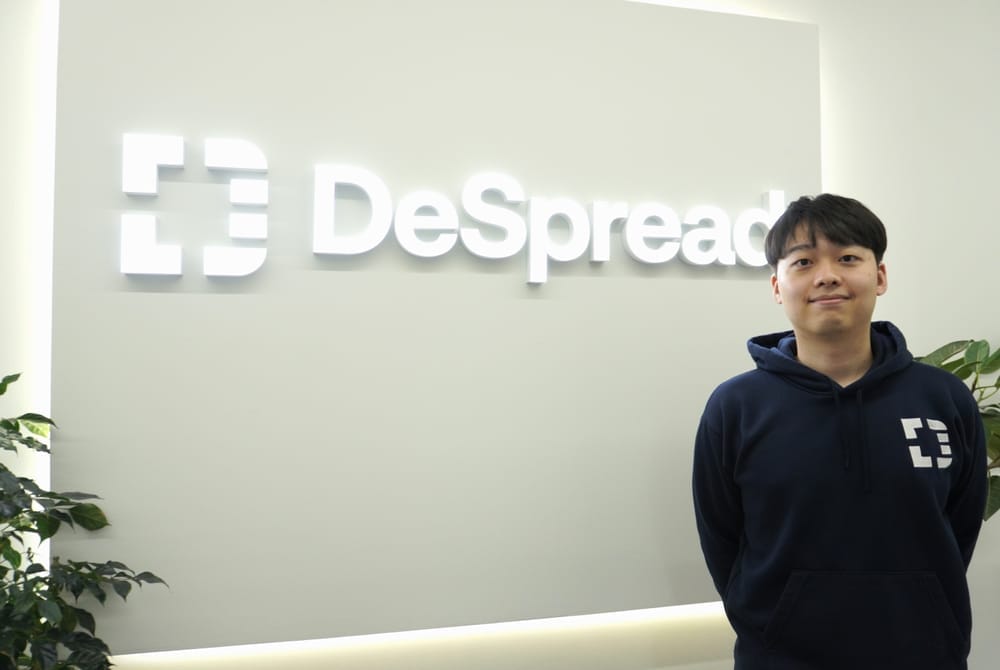
A Coffee Chat With D's Friends | Andy Park / Global BD
This time, we had the opportunity to meet with Andy Park and discuss the background behind DeSpread's expansion into the East Asian region and the company's image in the domestic Web 3 industry from an international perspective.

Got to Know Bitcoin From a Taiwanese Friend
**Disclaimer) The opinions expressed in this interview are those of the interviewer and do not represent the official statement of DeSpread.
Hello, I’m Eunji Cho at DeSpread. DeSpread is a company of “Degens” who are immersed in the Web 3 industry. Each of our team members has a unique personality, but we share the same DNA: a genuine love for Web 3. We work in a free-spirited atmosphere, but we’re all professionals in our respective fields.
Last time, we interviewed Gome Lee, Brand Marketing Lead for our 10th Coffee Chat with D’s Friends. This time, we had the opportunity to meet with Andy Park and discuss the background behind DeSpread's expansion into the East Asian region and the company's image in the domestic Web 3 industry from an international perspective.
Andy is responsible for Business Development (BD) in the East Asian market, particularly in the Chinese-speaking region. We will delve into the distinctive characteristics of the Web 3 industry in each region under
Andy's purview and explore three reasons why he views the domestic Web 3 market positively from the Chinese-speaking region perspective.

Eunji: Could you please introduce yourself?
"I'm Andy Park, responsible for Global Business Development at DeSpread. My main focus is on the Greater China market within the global context."
Eunji: I'm curious about the reason you got into Web 3 industry.
"I became interested in blockchain and Bitcoin through a friend. After graduating from university in Switzerland in 2017, I was preparing for a career in hotel management. As I was actively seeking employment in the hotel management field, I had about six months before starting my job.
Until then, I had focused solely on preparing for employment related to my hotel management major. However, I began to think about expanding my horizons and exploring new fields beyond my major during the remaining time. During this period, I met various friends, and one of them introduced me to 'Bitcoin.'
Even after that, I researched various materials related to blockchain on my own, and I was particularly impressed by the idea that 'P2P transactions' could be implemented without intermediaries, relying solely on technology. At that time, I had a positive view of the technology in this market, and I even thought that blockchain could change the world efficiently and securely.
With this conviction and anticipation for blockchain technology, I shifted my career to Web3 . As the first step in my Web 3 career, I joined a media company established by a friend, where we created blockchain-related content. At that time, most of the material was in English, scattered across platforms like Reddit, Bitcoin forums, or personal blogs, making it challenging to study blockchain. Consequently, I planned to lower the entry barriers in the Web 3 by creating educational content that could be easily understood by the general public."
Eunji: What did you do before joining DeSpread?
"I joined DeSpread in June of last year, and prior to that, I worked at Danal Fintech (Paycoin). I was responsible for business planning and strategic planning, handling tasks related to payment services and the crypto field. In the payment domain, my responsibilities included securing payment partners, designing payment structures, and establishing policies. In the crypto sector, I handled tasks related to exchanges and securing Web 3 partners."
Eunji: Why did you choose DeSpread within Web 3?
"I think the biggest reason was my desire for a new challenge. I had worked at Paycoin for about 4 years before, and I often felt that it was similar to traditional web 2 companies.
In the payment industry, where infrastructure plays a significant role, it was challenging to differentiate from traditional industries in terms of collaboration or service implementation. Especially in Korea, the payment business faced regulatory issues, limiting the freedom from a business perspective, which left me with a sense of regret.
So, I started looking for opportunities in a more liberating environment where I could take on various challenges. I had met Geumsan a few times before in a professional context, and coincidentally, he mentioned that DeSpread was preparing to expand into the East Asian market. It felt like a good fit, and that's how I ended up joining DeSpread."
Eunji: What do you do at DeSpread?
"I am in charge of Global Business Development, specifically overseeing the Greater China market.
DeSpread, founded in 2019, has successfully established itself in the Korean market. Now, our goal is to expand beyond Korea, targeting markets such as Japan, Greater China, and other East Asian regions.
Within this scope, I am responsible for the overall strategy for the Greater China market. This includes identifying partners in the Greater China region, formulating strategies for market entry, securing channels, and laying the foundation for our partners to exert influence in the Greater China market. Additionally, I handle tasks related to building a strong presence for DeSpread's partners in the Greater China market.
Having lived in Taiwan for an extended period, I am fluent in Mandarin Chinese at a local level. My career in Web 3 also began in Taiwan, allowing me to leverage my strengths in this role."

Eunji: Could you please introduce the DeSpread Strategy Team?
"The main task of the strategy team is to assist various projects in successfully entering the Korean market.
In the Web 3 industry, where multiple sectors overlap, our strategy team plays a crucial role in helping projects tailor their market entry strategies based on their characteristics, such as DeFi (Decentralized Finance), NFT (Non-Fungible Tokens), DEX (Decentralized Exchange), and more.
In addition, when projects seek partnerships with third parties, we facilitate connections and provide consultancy on business directions. More specific tasks include strengthening marketing and branding efforts.
Since last year, we have been expanding our business with the goal of entering the East Asian market."
Eunji: I'm curious about why DeSpread is paying attention to the East Asian region, including Greater China!
"We became interested in the demand potential for Web 3 in Asia. Particularly in the Asian region, East Asia stands out as the most well-equipped with conditions such as capital and infrastructure. This makes it an influential and appealing region in the blockchain industry, facilitating our business expansion.
Moreover, the Greater China region shares similar cultural traits with Korea compared to Western regions, while still having information gaps specific to each region. Due to our high market understanding, we believe this is a market where we can leverage our strengths. Therefore, we have decided to expand our business beyond Korea into the entire East Asian region.
We initiated entry into the Japanese market last year. Japan actively supports the Web 3 industry, with significant government backing and substantial funding. Regulations have considerably eased compared to before, contributing to our positive view of the Japanese market.
Next, we have started to enter the Greater China market. Greater China holds global influence not only in terms of on-chain demand but also in population and capital, making it a consistently significant region for tapping into in the future."
Eunji: Are there any differences between the Chinese-speaking Region and the Korean market that you have observed while working in the Web 3 industry?
"Each market seems to have its own characteristics. In particular, the Chinese-speaking region is divided into areas such as China, Hong Kong, Singapore, and Taiwan, and each region has its own unique features.
Firstly, mainland China, due to the ban on crypto, makes it somewhat challenging for us to find projects commonly seen in the industry. The on-off ramp is notably difficult, creating a substantial entry barrier for ordinary users. On-off ramp refers to the process of converting cash into crypto or vice versa.
To elaborate further, in Korea, the process of depositing Korean won into an exchange and converting it into coins is termed on-ramping. However, in China, there is no means to deposit funds into exchanges. Therefore, to convert cash into crypto, one must use OTC (over-the-counter) or P2P (peer-to-peer) methods, which are practically impossible for the general public.
While it is challenging in terms of investment and trading, China allows research on blockchain technology. Thus, various research and attempts are being made in different aspects. For example, China took the lead in starting CBDC, and there are numerous companies in China, like Wanxiang Blockchain, building blockchain infrastructure. However, these companies do not issue tokens, making them less known in the industry we encounter.
Hong Kong, although part of China, has a different regulatory atmosphere. It establishes regulations related to crypto and allows license applications. In short, it can be said that Hong Kong has a favorable attitude toward this industry. In reality, exchanges like Hashkey and OKX in Hong Kong have obtained virtual asset service provider licenses, and unlike mainland China, many OTC companies play a role in on-off ramp.
Singapore and Taiwan seem to be different as well. Singapore has had regulations established for a long time, making regulatory risks clear. As a result, many Korean and foreign companies establish their headquarters in Singapore and conduct business, naturally occupying the position of a global Web 3 hub in Asia.
As of last year, Taiwan allowed companies to engage in crypto businesses without special regulations. However, since the domestic market is not large, most companies based in Taiwan target the global market even if they set up offices there. Therefore, crypto companies in Singapore or Taiwan can be observed conducting business globally, regardless of their offices.
Finally, as you know, South Korea is in an environment with regulations but is gradually establishing them. Therefore, crypto companies are cautiously conducting business in line with regulations. Above all, Korea is led by centralized exchanges, and with a significant trading volume generated on exchanges, it is a market that can be expected for its potential."

Eunji: How is the Korean Web 3 market perceived in the Chinese-speaking region?
"I think the Chinese-speaking region views the Korean Web 3 market positively, and this can be broadly divided into three main aspects.
Firstly, the most fascinating aspect is the 'centralized exchange (CEX) spot market trading volume.' In the Chinese-speaking region, there is a keen interest in the phenomenon of the domestic spot market trading volume ranking within the global top three. Observing this trading volume, it seems that they consider it indicative of the potential market for Web 3.
Next, there is an expectation for 'potential Web 3 customers.' It is known that the on-chain activities, such as using MetaMask, are relatively low compared to the spot trading volume domestically. This could be interpreted as an indication that there are many potential customers who engage in crypto trading but have not yet experienced Web 3. I agree with this perspective, and I believe that when a 'killer dApp' that can sufficiently meet user demand emerges, people who were previously only engaged in centralized exchange trading may transition to become on-chain users.
Lastly, there seems to be interest in 'major Korean corporations.' Particularly, various major Korean corporations like Samsung, SK, and Nexon are making attempts with blockchain technology. Given the significant stature of Korean major corporations, there seems to be a positive approach towards finding collaboration opportunities from various perspectives regarding their forays into blockchain technology."
Eunji: What qualities do you think Web 3 BD should have?
"I believe a high level of understanding of the market is essential, and this applies not only to Web 3 but to all industries in general. To effectively promote the product and value one intends to sell, a fundamental understanding of the market's essence is crucial. This understanding enables us to know how to approach it from different perspectives.
In particular, for Web 3, due to the industry's nature of often sharing a specific technological stack or ecosystem, it's important to quickly grasp trends in the industry compared to other sectors. Web 3, being an open environment, witnesses numerous projects and technological updates. Therefore, I think it's crucial to be able to swiftly catch industry trends based on a solid foundational understanding. With this understanding, one should be able to boldly exclude projects that deviate from market trends and effectively highlight the strengths of collaborative projects in the market.
The Web 3 market, in particular, undergoes frequent changes in trends, so having a grasp of the market is essential to propose strategies that align with the current market dynamics. This aspect is also a strength of DeSpread, as during collaboration on projects, we not only focus on assigned tasks but also consistently engage in communication. It's during these communication processes that we need to make proposals in line with market trends, and to do so effectively, one must have comprehensive knowledge of the market."
Eunji: Are there any recent areas or projects that have caught your interest as a Web 3 Business Development professional?
"Lately, I find the Bitcoin ecosystem and Stacks particularly intriguing.
With the recent approval of the Bitcoin spot ETF, I anticipate an expansion of inflows from traditional finance in the future. Additionally, Bitcoin has the upcoming halving event, and Stacks had the Nakamoto upgrade in the first half of this year.
Despite infrastructure being somewhat lacking last year, tokens like Audius and BRC-20 gained tremendous popularity. I believe this reflects the users' expectations and demand for the Bitcoin ecosystem.
This year, with expectations of Bitcoin-related events and increased capital inflows, I anticipate another boom in the Bitcoin ecosystem, including projects like Audius and BRC-20, based on an even more improved environment.
I also find the DePin (Decentralized Physical Infrastructure Networks) sector interesting. DePin enables the collection of real-world data using physical devices, allowing for a close connection between blockchain and real-life. I believe this technology opens up various possibilities for experimentation. While the concept of DePin has been discussed a few years ago, I expect it to gain renewed attention, bringing forth exciting and new projects."
Eunji: You mentioned that you were in charge of project business development at your previous company. Are there any differences between that role and your responsibilities at DeSpread?
"In my previous company, the atmosphere was more like 'just focus on your assigned tasks.' However, at DeSpread, there is often a need for more flexible responses, requiring a greater reliance on one's own capabilities and responsibilities.
To draw a metaphor, in my previous company, I could be seen as playing the role of a single gear. Assuming the task was related to payments, my responsibility was to design a well-structured payment system and policies to launch the service.
On the other hand, at DeSpread, I might be metaphorically described as the lubricant between gears. The role involves ensuring smooth synergy between projects and finding collaboration points that enhance the overall effectiveness. Additionally, as DeSpread handles Web 3 consulting, there is a need to evaluate businesses objectively and provide projects with pragmatic directions."
Eunji: Do you have any personal goals or goals you want to achieve at DeSpread this year?
"I would like DeSpread to play the role of a gateway to East Asia beyond Korea in the Web 3 industry. My goal this year is to establish a foundation in the Chinese-speaking market and secure diverse partnerships.
Additionally, building my personal reputation in the Chinese-speaking market is my second goal and a personal challenge. It would be great if DeSpread is recognized as a reputable Web 3 consulting firm in the Chinese-speaking region when people hear the name 'DeSpread.'"

DeSpread’s Mission
DeSpread provides refined perspective for web 3 pioneers.